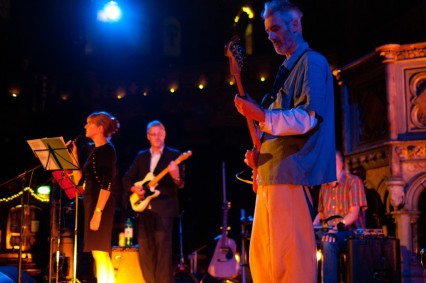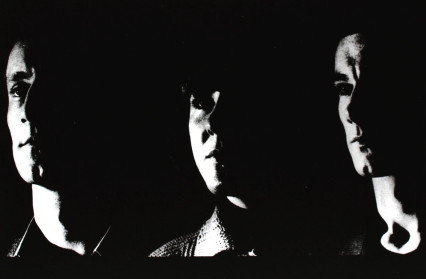In the week leading up to the band’s much-anticipated performance at David Byrne’s Meltdown, Craig Austin spoke with Stuart Moxham, the band’s guitarist and principle songwriter.
Young Marble Giants are a sporadically operative post-punk band initially formed in Cardiff in the late 1970s. Their seminal (and sole) album Colossal Youth proved to be a key musical touchstone for the likes of Kurt Cobain, R.E.M.’s Peter Buck, and Courtney Love (whose band Hole recorded their own take on YMG’s ‘Credit In the Straight World’). It continues to sell and to influence to this day.
‘The Young Marble Giants record Colossal Youth was quite a phenomenon. It’s the archetype of bedroom-made music. But because it has that lack of slickness it really draws you in.’ – David Byrne
Colossal.
Youth.
Or as Jon Savage relates, in his definitive and comprehensive book ‘Teenage – The Creation of Youth’, the notion of ‘the teenager triumphant’. A concept forged in the raging fire of outlandish naivety, and the all-too fleeting sensation of indestructible fervor. The kinds of emotions that occasionally motivate kids to form bands on little more than an overflowing personal reservoir of piss and vinegar. To articulate their turmoil and joy through song; to release records, and to adorn them with titles as provocatively totemic as Colossal Youth.

Or that’s what it says in the script, at least… A script that no-one seemingly thought to pass on to Stuart Moxham, guitarist and principle songwriter of the hugely influential, yet only infrequently active, Young Marble Giants whose take on the band’s legacy and impact is rooted firmly in the unembellished realities of the present.
‘You can take that from the title of course,’ Moxham reflects, ‘but it’s mainly about how the whole of Western society, America in particular, is so completely youth-obsessed, and in a way that’s not a good thing. It was always meant as something of a sarcastic title. Because when you think about it, the people who actually tend to do things are middle-aged, and the elderly. The ones who’ve been through it, have had the big life experiences and know who are comfortable in who they are; the people who run things, the people who make things happen. When you’re young, you have that energy and that sense of immortality, and that’s great, but our references to youth came almost solely out of the struggle to find a good name for the band, and I when I chanced upon a passage in a book that referenced both Colossal Youth and Young Marble Giants it all fell into place’.
Colossal Youth, originally released in 1980, remains the only album that Young Marble Giants ever released. It is a Spartan record in both its content and its intonation, its stark monochrome Kraftwerk-ian sleeve art a mere hint of the controlled austerity that lies within its grooves. This is an album that prospers by virtue of its surfeit of space, a measure of room to breathe as opposed to a wasted opportunity; and space, after all, the things that happen (or don’t happen) in the margins, is often where the magic occurs. Alison Statton’s voice is both brittle and forthright in equal measures, her unadorned vocal an anachronistic yet fitting counterpoint to the often teasing post-punk/funk industry of Stuart and brother Philip. Routinely referenced as a seminal influence by the likes of Cobain, Love, Buck, and Byrne himself it is a record that has succeeding in both retaining and cultivating a loyal and devoted audience, a legacy undiluted by the vagaries of fashion or fad. The ensuing vindication of Rough Trade’s Jeff Travis’s unambiguous assertion to the guitarist that ‘this is a record that will always sell’
Moxham remains undoubtedly proud of the key role that he played in the creation of Colossal Youth, yet also struggles with the perpetual fascination that it attracts at the unavoidable expense of his subsequent musical endeavours: ‘The only reason you’re interviewing me now is because I’m playing the Royal Festival Hall. Thirty years I’ve been writing songs but I might as well have been buried in a well in Alaska. The way the music business works these days means that unless you’re doing something like Meltdown it’s almost impossible to spark even the slightest interest. I hate to come across like a bitter and twisted musician but I have to accept it’s just a part of the ways things are. In the meantime you just need to enjoy doing what you do and try to make things happen’.
‘By contrast,’ Moxham continues, ‘Young Marble Giants was an important part of my life, it’s a great thing, I love the music, we all get on really well, but there’s really nothing happening with that band apart from a couple of gigs a year. Regardless, I’m known as the guy from Young Marble Giants to this day, and that can often be quite limiting as people love to have things, and people, in their box. Creatively, it’s somewhat moribund. To be in a band playing exactly the same music, albeit with a degree of improvisation, you wrote and played when you were 25 can be quite frustrating when you’re also constantly writing and recording new material. I write songs almost unconsciously, without a pre-defined purpose or aim, and it might take me years to work out what it is that I was seeking to achieve.’ ‘If a lyric isn’t as explicit as “Ooh, baby I miss you”,’ he explains, ‘if it’s more poetic than that, more equivocal, then it’s open to different interpretation by lots of people. I love that thing where you hear lyrics the wrong way round. It can be really funny. In the Young Marble Giants song ‘The Man Amplifier‘ there’s a line which says lubricate the inner man, yet in the Gower last weekend a guy told Alison that he’d always thought the line was lubricate the enema’. ‘We all interpret things differently,’ Moxham laughs, ‘art exists to make people think after all, it takes you to places you never knew existed, its stretches your brain in a recreational way that day-to-day life can’t ever hope to compete with.’
The Cardiff of the late 1970s from which Young Marble Giants was spawned was not the shiny civic temple of chain-store commerce and public investment that it has since become, and I wonder what Moxham and colleagues were inspired by during the gestation of Colossal Youth: ‘We were listening to the contemporary sounds of the time, I suppose,’ he explains, ‘The Steve Miller Band, Kraftwerk, Can, the first Dire Straits album, which seemed like quite a big deal at the time. The Pretenders and Hall & Oates. Bowie, Eno, that kind of stuff; the artier end of things’. ‘Talking Heads too,’ he adds, in a fitting reference to the aforementioned Byrne. ‘I do remember the Welsh being very much perceived as the poor cousins at the time,’ Moxham continues; ‘…and as far as the English were concerned, the Irish were even worse. No one was looking at Wales, no-one was even thinking about Wales. And to be fair, Wales wasn’t really that interested or excited about us! We left to live in London, to make this record that’s since been described as being extremely influential, and it took BBC Wales 27 years to interview us! That whole Cool Cymru thing happened in the late 90s and that was great but it’s always struck me that there’s always been a lot of inertia in Wales. Things have certainly improved, but it’s still a difficult place to get traction, and for us it was left to the people at Rough Trade to pick up on what we were doing.’
In this sense, and regardless of the more commercial elements of the album’s stimulus, it is hard – even in the less commercially demanding environment of 1980 – to imagine it being a record released by anyone other than Rough Trade, a label that at the time also provided artistic succour to the unconventional likes of The Fall and the then embryonic Scritti Politti. ‘Rough Trade, and Geoff Travis in particular, were all about the music,’ Moxham recalls. ‘It wasn’t about the best cigars for the shareholders at Christmas. They were really honest, decent people, proper lefty hippy people. Cool people. They existed in a totally alternative universe of their own making. But at the time it was the only environment I knew, as it was the only time that any of us had made a record. We were so lucky in so many ways, but mainly because they were a really good bunch of people with principles. Rough Trade is interested in being part of the cutting edge, for them that’s where the excitement comes from, and that kind of approach really inspires the artists. It was never about aspiring to be Mick Jagger or Bruce Springsteen, it was always more visceral and exciting than that’.
‘The influence of Young Marble Giants took a lot of time to percolate though’, Moxham suggests. ‘I remember being in America and being told about how Kurt Cobain and Courtney Love had been referencing Colossal Youth, but I’ve never been a great one for consuming music and it kind of passed me by. I’ve never really been able to afford to buy a lot of records. I’d mainly listen to other people’s records, and that hasn’t changed. Nothing happened for a long time but the record seemed to continue to sell and as a consequence of word-of-mouth and the reissue that Domino put out a few years back we now find ourselves with this whole new audience, an audience that contains almost two different generations of people’.
‘Colossal Youth might be something of a time capsule for me,’ he adds, ‘but for much of the audience it still feels extremely contemporary’.
Read Wales Arts Review‘s take on Colossal Youth in our Classic Welsh Albums series.
Further information on Stuart Moxham’s current musical output can be found at www.stuartmoxham.co.uk
Young Marble Giants play David Byrne’s Meltdown on August 27th












